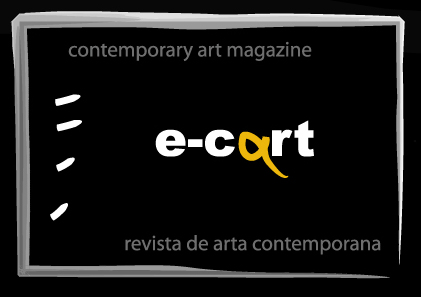IDEA Arts + Society (2003–) [Romanian/English]
Filed under magazine | Tags: · activism, art, art criticism, art theory, autonomy, capitalism, contemporary art, cultural criticism, eastern europe, institutional critique, performance art, politics, romania, society, southeastern europe, theory, video art

Idea 36-37, 2010

Idea 35, 2010
“IDEA art+society is a multiannual publication produced by IDEA, Cluj. It is published under its current form since 2003.
Allegiance to the exigency of genuine theory – a theory which is, first of all, its own practice – this is the program of IDEA arts+society magazine. This means: the practice of the concerned eye, which can be rigorous solely through the unconditional solidarity with the concrete. It is a practice of thinking which is alien to any aestheticism, hostile to any institutionalized transcendence, immune to the biased fiction of ideological neutrality, and remote from the pernicious language of our contemporary culture of ‘experts.’ In brief, it is the practice of critical and defiant reflection, dramatically lacking in the intellectual-civic debates of present-day Romania.
The graphical and logical operator ‘+’ functions as the material figura of all these dimensions, to which we can add artistic education and the public influence of art. The various ways of deciphering this sign suggest the manifold articulations between the artistic and the social realm. That is, the political.”
IDEA artă + societate / IDEA arts + society
Editors: Bogdan Ghiu, Ciprian Mureșan, Timotei Nădășan (editor-in-chief), Alexandru Polgár, Adrian T. Sîrbu, Ovidiu Țichindeleanu, Raluca Voinea
ISSN 1583–8293
e-cart, contemporary art magazine, Nr. 1-8 (2003-2007) [English/Romanian]
Filed under e-zine | Tags: · art, art criticism, contemporary art, east-central europe, romania, southeastern europe

e-cart.ro is a contemporary art magazine in an exclusively electronic format. It is an independent and not-for-profit initiative, founded in 2003 by Raluca Voinea, Simona Nastac, Eduard Constantin and Madalin Geana.
The magazine features exhibition reviews, interviews, artist portfolios, projects presentations, and texts by art critics, curators and artists. It aims at creating a space of encounter between contemporary art in Romania and abroad.
Issue 8, 2007
View online
Issue 7, March 2006
Art in Eastern Europe
View online
Issue 6, August 2005
The Venice Biennale; Archives (part I); Exhibitions; Projects
View online
Issue 5, September 2004
Artnetlab in Maribor, at the International Festival of Computer Arts; Identity and language; Diploma projects; etc.
View online
Issue 4, May 2004
Art/artists and spaces; Berlin Biennial 3; Vienna days in Bucharest; etc.
View online
Issue 3, February 2004
Education in/with Art
View online
Issue 2, November 2003
Istanbul Biennial 2003; Workshop: Real Presence 3 – Belgrad – 2003; etc.
View online
Issue 1, September 2003
Periferic 6 in Iasi: “Prophetic Corners”; H.arta group; Dan Perjovschi; Diploma projects
View online
Editors: Raluca Voinea and Simona Nastac
Publisher: e-cart.ro, Bucharest
Robert T. Holt: Radio Free Europe (1958)
Filed under book | Tags: · bulgaria, central europe, communism, czechoslovakia, history, hungary, mass media, poland, politics, propaganda, public broadcasting, radio, romania, southeastern europe

What is radio Free Europe? Where does it broadcast? Who runs it? What are its purposes? Although thousands of Americans are familiar with Radio Free Europe (many have contributed to its support through the Crusade for Freedom campaigns), few know enough about its background to answer these and similar questions. In this book a political scientist with first-hand knowledge gives a detailed account of the organization and development of this unique propaganda enterprise.
Radio Free Europe was established as a private broadcasting project in 1949 by the Free Europe Committee, headed by Joseph C. Grew, as part of the Committee’s program of broad, long-range assistance to democratic exiles from totalitarian countries. The operational headquarters are located at Munich, and the broadcasts are directed to the people of five satellite countries: Czechoslovakia, Hungary, Romania, Bulgaria, and Poland.
Professor Holt tells how Radio Free Europe was established, outlines its basic policies and objectives, describes its organization, personnel, programming, and services, discusses transmission problems, and examines the effectiveness of the propaganda. He describes in detail the role of RFE in connection with the uprisings in Poland and Hungary and analyzes the charges that RFE stimulated the Hungarian revolt.
Publisher University of Minnesota Press, 1958
ISBN 978-0-8166-5788-9
249 pages

